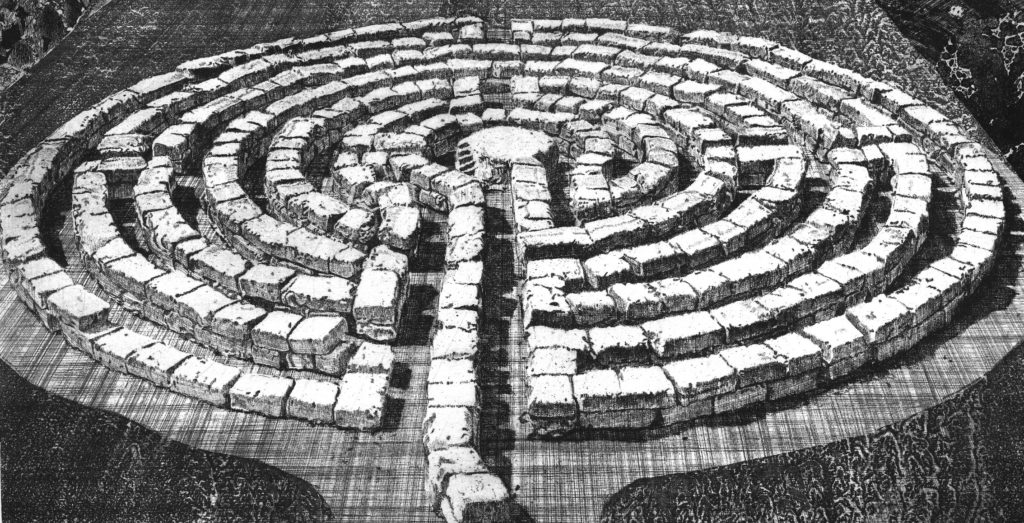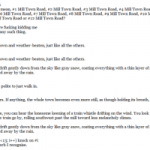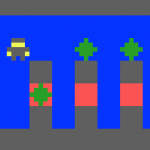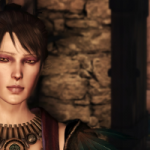
Puzzles
March 26, 2018 - Features
Adventure games make me nervous. You may have noticed, if you’re attuned to these things, that the jokes and the acting out against the parser have something of the air of a defense mechanism. Whenever I look at a game and realize I need to do an adventure-type puzzle, I start picturing a small version of myself sullenly kicking the back of the chair in front of me in class. I know I’m going to fail, and I want to get my revenge in now, because I’ll be too sad to do so after.
I start writing and then throw away a lot of drafts. A lot of them are written around a small set of issues that I want to write about, but never find an angle on. One of these is something like a taxonomy of adventure game puzzles, and the related puzzles in classic parser-style interactive fiction. Ever since I started writing about games, I’ve tried to figure out what makes them distinct as an activity and why they bother me so much.
In my early days, when I was given to speaking in the language of human-computer interaction academia, I wrote about how adventure puzzles feel more object-driven than verb-driven. That is, in most of the games I play, I get a limited number of verbs (jump, shoot, dig, craft, talk to, etc.) and some rules for how to apply them to objects in the world, then I go forth and apply them at will. Some are context dependent, but generally the core verbs are always available in their context no matter what objects exist around me. In adventure games and interactive fiction, by contrast, it feels like the objects come first, and the verbs are kind of vague. I have an inventory, which is very important; and a lot of my verbs boil down to “USE <object>”. The function comes from things in the environment, not repeatable actions that belong to the protagonist.
I threw this draft away. It felt like I was close to something, but there were so many edge cases in the distinction I was trying to make, and it doesn’t map that well to how, say, old Sierra games use their parser (and its typically limited set of actually-used verbs). And I wanted to stop writing so academically, it alienates people.
I tried to write around this issue as I got more into the Line on Sierra project. It felt better to write about specific puzzles and games than about broad tendencies of genre, for one thing. I’ve tried to write about how the possibility space in the Police Quest series makes me grind my teeth, for example, and I’ve had some success there. The closest I think I’ve come is the discussion of procedural vs. mystery gaming in Police Quest I. But I keep trying to write a definition of adventure puzzles in these articles, and I keep throwing away the draft.
I want to define this because I often feel angry when I play adventure games and interactive fiction, and it worries me, and I want to understand why. My first instinct, when faced with an emotional reaction that bothers me, is to identify and taxonomize the experiences that consistently trigger that reaction. Certain kind of noises make me skittish, which can lead to outbursts or meltdowns. Identify the kinds of noises (e.g. loud low frequency humming), and I can recognize them and name them when they start happening, get those noise cancelling headphones on, avoid the meltdown.
I can’t taxonomize these puzzles, so they keep bothering me, and sometimes a thing like them sneaks up on me in a game that seems otherwise fine. Worse, sometimes I’ll be in the office or at home, and someone will say something, and I’ll be a small version of myself sullenly kicking the seat in front of me.
I don’t have a taxonomy, but I think I’m starting to develop a theory.
So let’s run through how I make a decision. Let’s say I’m going to decide what to wear for the day. The first step is to lie in bed and despair. I don’t mean to comically exaggerate, I mean that when I think about what to wear in the morning, my first response is to feel a deep sense of doom and inevitable failure. When I do get out of bed I’ll go look in a drawer, or an unfolded pile of laundry, and think for a while about how I should be better at doing and folding laundry, and better at choosing clothes that flatter me, and maybe I should purge all my clothes and start rebuilding my wardrobe under a different schema.
I’ll think about all the advice on buying and wearing clothes I’ve ever read, and I will consider the personality traits of the advice-givers that I envy. And if I know these advice-givers personally, I will start thinking about the ways I have disappointed them in the past, and my internal monologue will turn into a long contentious apology while I imagine them staring at me, dumbfounded and scared.
As this goes on, I’ll be sorting through my drawers or laundry pile, trying to sort things down to a smaller set of constraints. If I can pick out a pair of pants or leggings based on cleanliness level and recency of use, that narrows things down. Once I get to the point of having bottoms and an undershirt on, I calm down a little. Tops can be swapped in and out easily, so I just have to keep switching them out until I can look in the mirror and not freak out.
I know I’m done when I look more or less like I’ve looked on a previous occasion when nothing bad happened. I imagine someone looking at me and trying to recreate the decisions I made in getting dressed, and I aim for that imaginary person to be able to trace a logical train of thought. Some days I look at myself and see nothing but a chaotic jumble that no one could make sense of. But most days I can imagine someone being like, well, that’s a little weird, but I can see what you’re going for. And that’s how I decide what to wear.
Speculate away. I am as god made me: not well. The problem of getting dressed is analogous to a lot of problems I face day to day, problems where I have a lot of options (but not infinite) and whatever I decide on is going to get assessed by other people according to criteria I don’t understand and can’t form a reliable model of. You should see me trying to apply for a job. I don’t have too many school-anxiety dreams where I wake up with a flood of relief that I don’t need to take tests anymore; what I have is dreams about dating where I wake up with a flood of relief that I’ve been in a relationship for years. Tests! Tests are comforting: the criteria are fixed and theoretically knowable. Decorating a room? Pure terror.
Right at the core of all this is not so much the fear that I’ll get things wrong – I understand that these are situations without right and wrong answers – but that I’ll come up with an answer that is obviously, to others, the product of a disordered mind. I don’t need to do well as long as I fail in a way that is predictable to most people. What is important above all else, what must be attended to first, is that they not figure out there’s something wrong with me. Anything beyond that – being liked, being valuable, being interesting – gets whatever energy is left over, which is typically none.
* * *
In videogames, roleplaying games are my comfort food. I get quests, I figure out how to do them, and my success (or failure) is acknowledged by other game characters. It feels nice. It’s the kind of loop I can keep doing forever. I don’t like it, though, when the quest design is too mechanical. I didn’t like the quests in Skyrim, for example, with their “go to this map marker and kill the stuff” structure. I liked the game better once I downloaded a mod that adds location descriptions to the quest text, so you can figure out where to go without just following the compass. It’s not killing the monsters I find satisfying, it’s navigating there, assessing the situation, anticipating what I’ll find. It’s a fantasy of being able to make plans.
In roleplaying game quests, you’re generally given a desired end state by a character and some guidance as to how to get there. “I want my MacGuffin back, so go to the caves and wipe out the bandits who stole it.” Sometimes there are multiple ways to get there, and I like that too. “Wipe the bandits out or negotiate with them.” I like the opportunity to define my character through action. Sometimes once you get there you find that the situation isn’t what you thought, and I like that best of all. “This MacGuffin belonged to our family before the Duke’s father seized our lands. We’re just stealing back what rightfully belongs to us.” An opportunity to choose between conflicting goals, and to plan a way to get out of a messy situation with the protagonist’s goals intact.
The goals are the thing. They’re almost always all there in the text: please this faction or that one, get a good ending or a tragic one, marry this guy or the other guy, win the war by any means necessary or decide what your limits are. If you’re deciding which quest to pursue or playing a branching storyline, a lot of the game is about picking among goals.
The games I like best, like Fallout: New Vegas or the Dragon Age or Persona series, keep circling back to the available goals through their themes and character beats. They create a sense of unity between the type of person your protagonist is and the types of outcomes they can get. Because you got along with so-and-so, you can do this now. There are opportunities available to you because you are Charming or Aggressive or Cunning. They tell me: here are some goals you might want, and here’s the type of person you have to be to get them.
I can’t get enough of this fantasy. A world full of goals to choose from, and a limited set of actions you can take to chase after them. I can make plans, and I can feel what it’s like for those plans to succeed or to go awry. Honestly, the games I feel most affectionate towards are the ones where my plans did fail. When you don’t even know what it’s like to want things clearly, the experience of fictionally losing something you wanted can be thrilling beyond measure. If you know what you want, you can decide how to behave and who to be. Whether you get the thing or not is beside the point; in fact, losing provides clearer feedback. I like to look back and figure out which decisions landed me in this lousy situation, or if there was any way to avoid it at all. I think that’s how you get better at planning.
* * *
Both roleplaying games and adventure games tend to be story-heavy games where you move forward by clearing the protagonist’s obstacles. But if roleplaying games give me the materials to choose among goals and decide who I need to be to reach them, adventure games give me all the components of a plan and then wait for me to figure out what it is. You have a lantern, a flute, the ability to jump, and you can turn into a frog at will: go find out what part of the map these things become useful in, and how.
In this case, an example from King’s Quest IV, using these items in the right places and at the right times gets you the magic fruit that you need for the best ending of the game. But there’s no way to know that ahead of time. You see a waterfall, you think there might be something behind it, and if you’re on a wavelength with the puzzle designer you might think “I bet a frog could swim under that waterfall.” You get to a dark cave and then the lantern makes sense. You find a snake and now you can think that you need use the flute to charm it. And now you have a fruit. Obstacles arise unexpectedly and are dealt with by something you conveniently have on hand, dreamlike. If you didn’t have one of these items, then you should have done a different part of the game first. It’s not that you planned poorly, because you had no way of knowing what was beyond the waterfall. You just did it wrong.
When I start up a Sierra game, I get excited, because these are weird old games and I often don’t know what to expect. But I also feel the same sense of doom I do when I think about what to wear in the morning. I know I’ll eventually end up staring at a pile of verbs and inventory items thinking about all the possible ways I can disappoint the spectre of the game designer. There are goals in adventure games, of course, but they mostly boil down to “figure out what you’re meant to do.” I have goals getting dressed too: convince people that the way I think is normal. Roleplaying games, the kind I like, help me pretend I can think normally. Adventure games wait for me to think the way I’m supposed to.
I played Emily Short’s Galatea once for about a minute. It’s a classic interactive fiction game known for its open-ended exploration of a conversation space. I love Short’s work, and everything I’ve heard about Galatea makes it sound fascinating. But in the game, I looked at Galatea, and my character just stood there while I started picturing a small version of myself sullenly kicking the seat in front of me. Then Galatea said something like, “You know, people usually try talking to me.” I shut the game down immediately. An open space, no goals, and a character to tell me I’m not behaving like people normally do. What a perfect simulation of how everything feels, all the time.
“Labyrinth 28” by Toni Pecoraro is licensed under CC BY 3.0.


